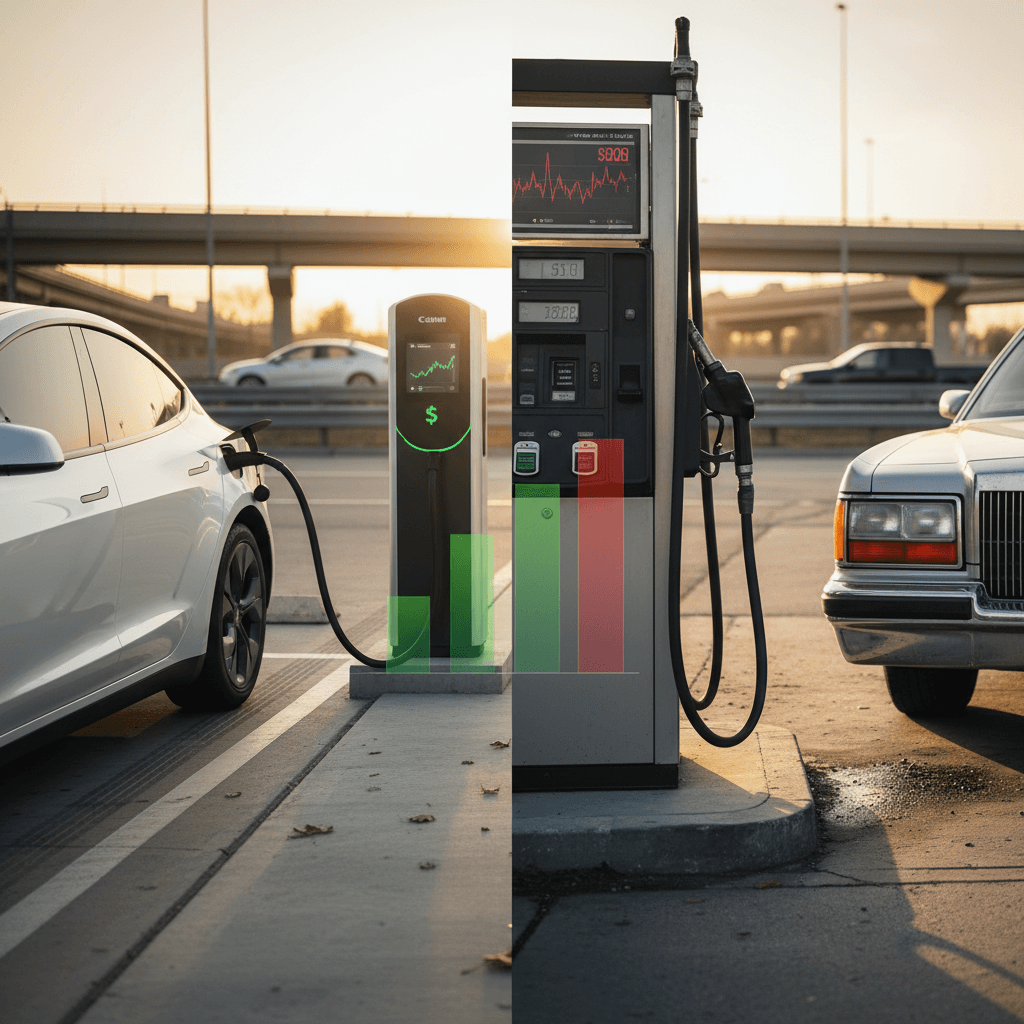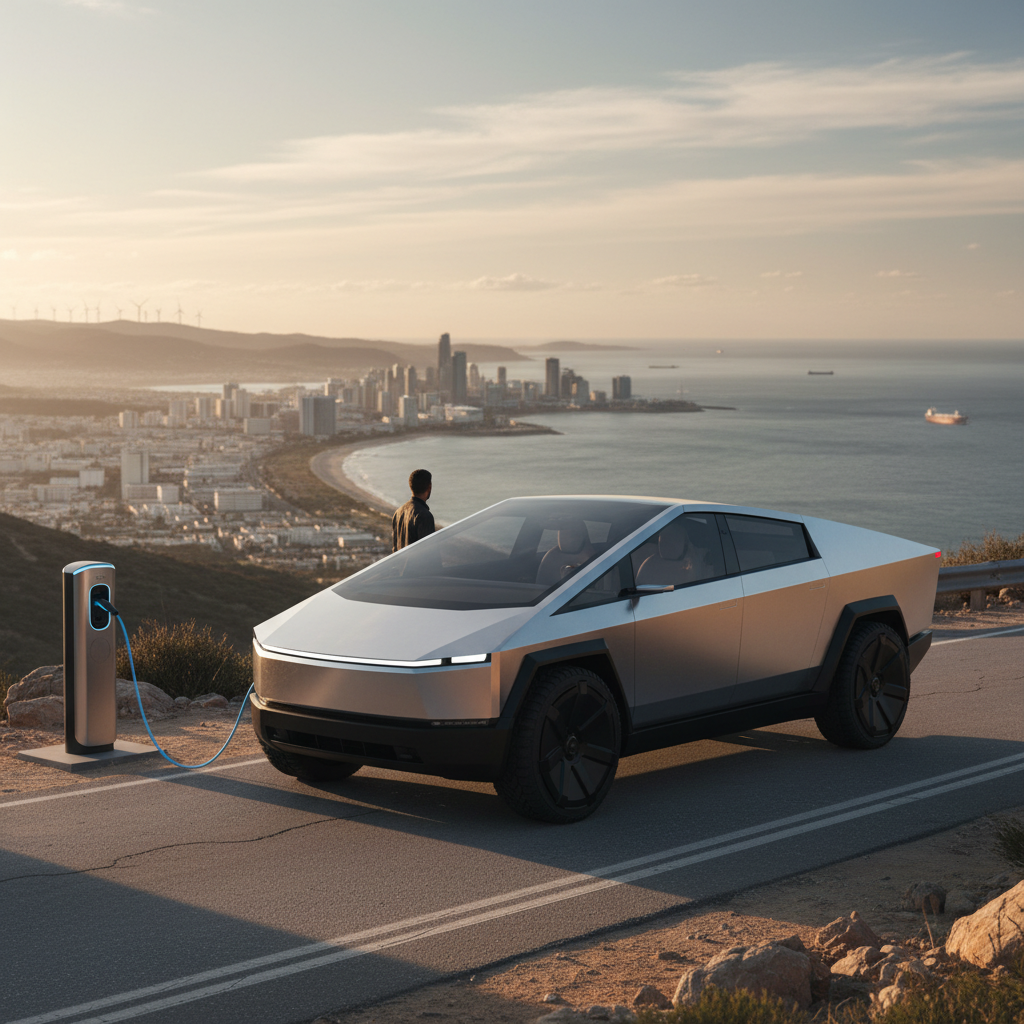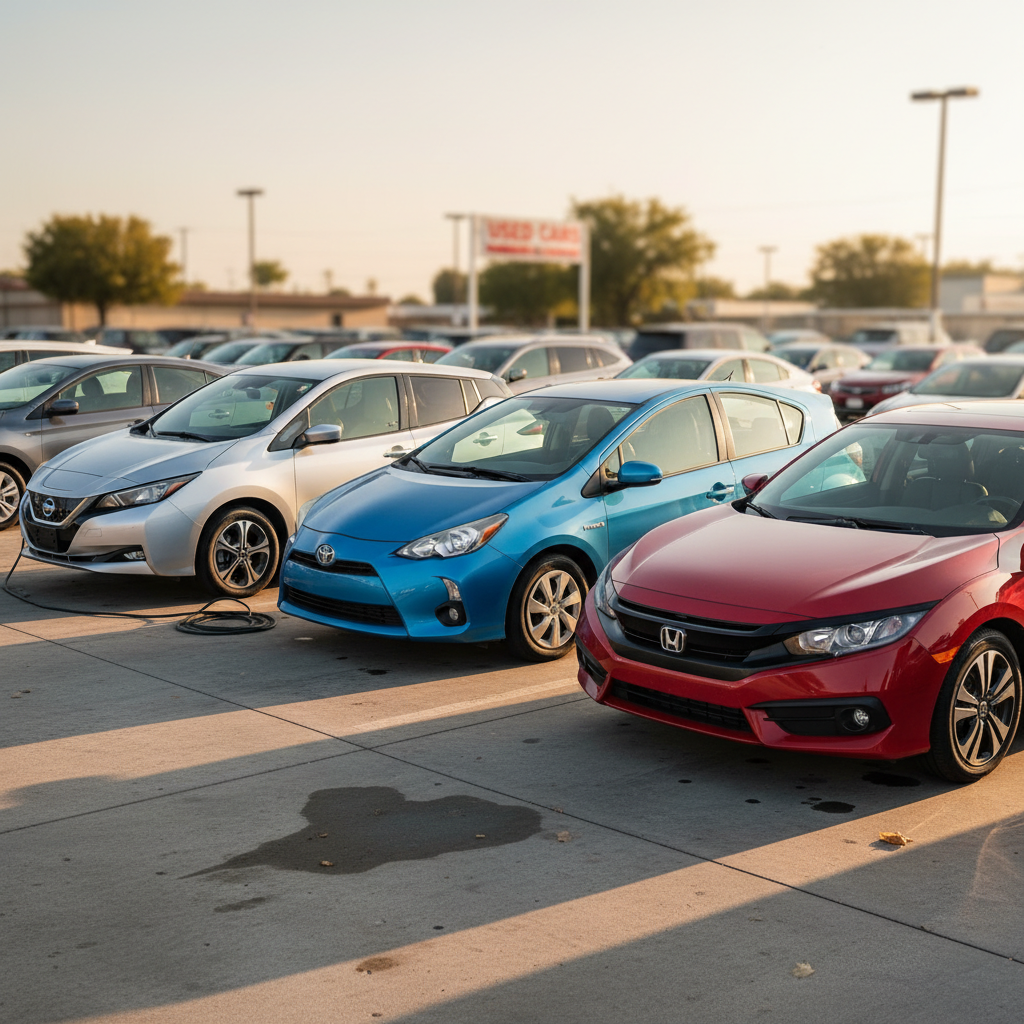If you strip away the politics and the hype, most shoppers come back to one blunt question: what does an electric car really cost per mile vs gas? In 2025 U.S. conditions, the answer is that an electric car typically costs about $0.04–$0.06 per mile to “fuel” at home, while a comparable gas car lands closer to $0.10–$0.13 per mile at current pump prices. Let’s unpack how those numbers work, and how to run them for your own car.
Quick takeaway
How much does an electric car cost per mile?
The cleanest way to answer this is with a simple formula using your electricity price and your EV’s efficiency rating (kWh per 100 miles).
- Find your residential electricity rate on your utility bill. In 2025, the U.S. average is about $0.17 per kWh (16–18 cents in many states).
- Look up your EV’s efficiency. The window sticker and EPA site list this as kWh/100 miles (for example, 27 kWh/100 mi).
- Use this formula: EV cost per mile = (kWh per 100 miles × electricity price) ÷ 100.
Rule of thumb
Typical electric cost per mile in 2025
Using U.S. average residential electricity of about $0.17/kWh
Efficient compact EV
Example: Chevy Equinox EV, Hyundai Kona Electric
- Efficiency: ~27 kWh/100 mi
- Cost per mile: (27 × $0.17) ÷ 100 ≈ $0.046/mi
- Cost per 1,000 miles: about $46
Family crossover EV
Example: Tesla Model Y, Ford Mustang Mach‑E
- Efficiency: ~30 kWh/100 mi
- Cost per mile: (30 × $0.17) ÷ 100 ≈ $0.051/mi
- Cost per 1,000 miles: about $51
Larger SUV / pickup EV
Example: F‑150 Lightning, Rivian R1T
- Efficiency: ~40 kWh/100 mi
- Cost per mile: (40 × $0.17) ÷ 100 ≈ $0.068/mi
- Cost per 1,000 miles: about $68
Fast charging costs more
How much does a gas car cost per mile?
For gasoline, you only need two things: your local gas price per gallon and your car’s miles per gallon (mpg) rating.
- Find your local regular‑grade gas price. Nationally in 2024, gas averaged about $3.30 per gallon, and forecasts for 2025 hover around $3.00–$3.15. In many places today, seeing something close to $3.10/gal is normal.
- Check your car’s real‑world mpg. Use the EPA rating or your trip computer.
- Use this formula: Gas cost per mile = gas price per gallon ÷ mpg.
Typical gas cost per mile in 2025
Using $3.10 per gallon as a reasonable national average
Efficient compact gas car
Example: Corolla, Civic, Elantra
- Real‑world economy: ~35 mpg
- Cost per mile: $3.10 ÷ 35 ≈ $0.089/mi
- Cost per 1,000 miles: about $89
Family crossover SUV
Example: RAV4, CR‑V, Equinox (gas)
- Real‑world economy: ~28 mpg
- Cost per mile: $3.10 ÷ 28 ≈ $0.111/mi
- Cost per 1,000 miles: about $111
Full‑size pickup
Example: F‑150, Silverado, Ram 1500
- Real‑world economy: ~18 mpg
- Cost per mile: $3.10 ÷ 18 ≈ $0.172/mi
- Cost per 1,000 miles: about $172
Putting it side by side
Side-by-side EV vs gas cost per mile examples
Let’s move from theory to something you can feel: a year’s worth of driving. We’ll use 12,000 miles per year, close to the U.S. average.
Case study 1: Compact commuter
12,000 miles per year, average 2025 U.S. prices
| Electric compact | Gas compact | |
|---|---|---|
| Energy/efficiency | 27 kWh/100 mi (~109 MPGe) | 35 mpg |
| Price input | $0.17/kWh | $3.10/gal |
| Fuel cost per mile | ≈ $0.046/mi | ≈ $0.089/mi |
| Fuel cost per 12,000 mi | ≈ $552/year | ≈ $1,068/year |
| Annual fuel savings with EV | ≈ $516/year |
Electric compact vs gas compact cost per mile and per year
Case study 2: Family crossover SUV
12,000 miles per year, average 2025 U.S. prices
| Electric crossover | Gas crossover | |
|---|---|---|
| Energy/efficiency | 30 kWh/100 mi | 28 mpg |
| Price input | $0.17/kWh | $3.10/gal |
| Fuel cost per mile | ≈ $0.051/mi | ≈ $0.111/mi |
| Fuel cost per 12,000 mi | ≈ $612/year | ≈ $1,332/year |
| Annual fuel savings with EV | ≈ $720/year |
Electric crossover vs gas crossover cost per mile and per year
Case study 3: Work truck
12,000 miles per year, average 2025 U.S. prices
| Electric truck | Gas truck | |
|---|---|---|
| Energy/efficiency | 40 kWh/100 mi | 18 mpg |
| Price input | $0.17/kWh | $3.10/gal |
| Fuel cost per mile | ≈ $0.068/mi | ≈ $0.172/mi |
| Fuel cost per 12,000 mi | ≈ $816/year | ≈ $2,064/year |
| Annual fuel savings with EV | ≈ $1,248/year |
Electric truck vs gas truck cost per mile and per year
What those savings can do
Break-even: when higher electricity prices shrink the gap
Not everyone pays the national average for electricity. If you live in California, New England, or Hawaii, your power may be north of $0.30–$0.40 per kWh. That changes the math, but usually doesn’t erase the advantage, especially if gas is expensive where you live.
High electricity, average gas
Say your power is $0.32/kWh and gas is still about $3.10/gal. Using the compact commuter example:
- EV: (27 × $0.32) ÷ 100 ≈ $0.086/mi
- Gas: $3.10 ÷ 35 ≈ $0.089/mi
Now the fuel cost per mile is almost a wash. You still get EV benefits like lower maintenance and no tailpipe emissions, but the pure energy savings are tiny.
High electricity, high gas
In a state where both electricity and gas are pricey, say $0.32/kWh and $4.40/gal, things swing back toward the EV:
- EV compact: ≈ $0.086/mi (same as above)
- Gas compact: $4.40 ÷ 35 ≈ $0.126/mi
Now you’re saving about 4 cents per mile again, roughly $480 per 12,000 miles on fuel alone.
The real danger zone: all-DC-fast-charging
EV vs gas: big-picture cost signals
Beyond fuel: maintenance and total cost of ownership
Cost per mile shouldn’t stop at fuel. When you own a car, every mile also carries maintenance, repairs, insurance, depreciation, and financing. Industry studies in 2025 show that while EVs can have higher purchase price and insurance, they claw back ground with lower fuel and maintenance.
Where EVs save, and where they don’t
Comparing typical EV vs gas ownership costs over time
Where EVs usually win
- Fuel: Cheaper per mile when home‑charged, especially if gas spikes.
- Maintenance: No oil changes; fewer moving parts; brake wear often lower thanks to regen.
- Stop‑and‑go driving: EV efficiency barely changes in city traffic, while gas mpg tanks.
Where EVs can lag
- Purchase price: New EVs often cost more than similar new gas cars (used EVs narrow this gap).
- Insurance: Higher repair costs and MSRPs can mean higher premiums.
- Depreciation: Model‑specific; some EVs have fallen faster in value than gas equivalents, great for used buyers, tough on first owners.
Stretch the savings
How to calc your own cost per mile (step by step)
You don’t need a spreadsheet or an engineering degree. Grab your last utility bill, your gas receipts, and your vehicles’ window stickers, and follow this.
DIY EV vs gas cost-per-mile calculator
1. Nail down your electricity price
From your electric bill, divide the <strong>total charge</strong> (including fees and taxes) by the <strong>total kWh used</strong> to get your true per‑kWh cost. It may be a bit higher than the headline rate.
2. Find your EV efficiency
Look for the <strong>kWh/100 mi</strong> figure on the Monroney sticker or on fueleconomy.gov. If you already own the EV, many dashboards show your long‑term kWh/100‑mi average.
3. Calculate EV cost per mile
Use <strong>EV cost per mile = (kWh/100 mi × $/kWh) ÷ 100</strong>. Do the math once and write the result on a sticky note; that’s your personal number.
4. Capture your real gas price
Look at recent receipts or your favorite gas app, and average what you actually pay per gallon rather than using a national average.
5. Confirm your gas mpg
Use the real‑world mpg your car’s trip computer shows over several tanks. If you tow or do short trips in winter, your true mpg may be well below the EPA sticker.
6. Calculate gas cost per mile
Use <strong>Gas cost per mile = $/gal ÷ mpg</strong>. Again, write this down where you’ll see it, on your garage wall, perhaps.
7. Translate into yearly dollars
Multiply each cost‑per‑mile figure by your annual miles. That turns “a few cents” into real money, often hundreds of dollars a year either way.
Shortcut for shoppers
Used EVs: why cost per mile gets even better
So far we’ve talked mostly about fuel cost per mile. But if you’re buying, the smartest play for many households right now is a used EV, where someone else has already eaten the steepest new‑car depreciation. That’s exactly the niche Recharged operates in.
Lower purchase price, same cheap fuel
A 3‑ to 5‑year‑old EV often sells for a fraction of its original MSRP, yet it still delivers that low 4–7¢/mi electricity cost. Spread over the life of the car, your total cost per mile (purchase + fuel + maintenance) can undercut a newer gas car by a wide margin.
Battery health and transparency matter
The wild card with used EVs is the battery. That’s why Recharged includes a Recharged Score Report on every car, with verified battery health and fair‑market pricing. You see how much usable battery capacity remains before you commit, crucial for predicting your long‑term cost per mile.
How Recharged can help
Common questions about EV vs gas cost per mile
EV vs gas cost per mile: FAQ
Bottom line: should you switch to an EV now?
If all you care about is energy cost per mile, an electric car wins over gas in most of the U.S. in 2025, often by a wide margin when you charge at home. A compact EV at roughly five cents a mile versus a similar gas car near nine cents doesn’t sound dramatic until you do the annual math and see hundreds of dollars in savings every year.
The smarter question is whether an EV fits your whole life and budget: home charging access, local electricity and gas prices, your daily mileage, and what you can comfortably afford to finance. That’s where a well‑chosen used EV, with known battery health and fair pricing, becomes very compelling.
If you’re ready to explore that next step, browse used EVs with Recharged, lean on EV‑specialist support to pick the right model, and let the numbers, your actual cost per mile, not just the sticker price, do the talking.



